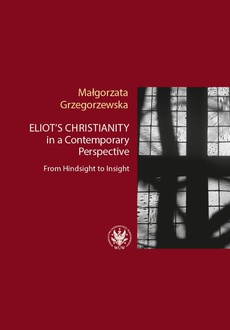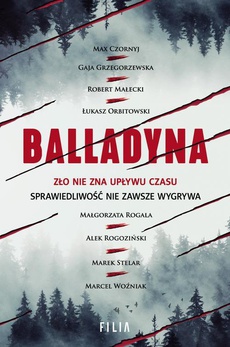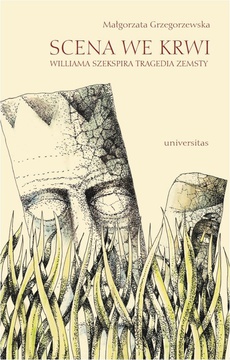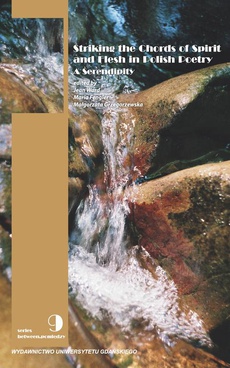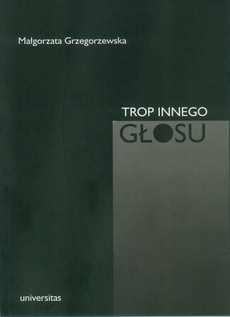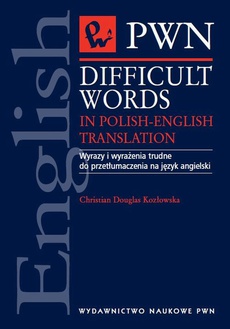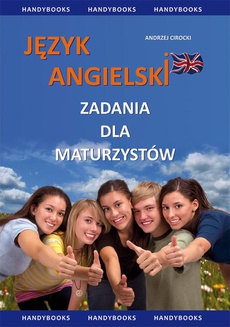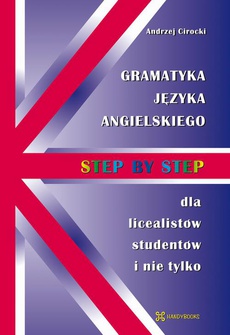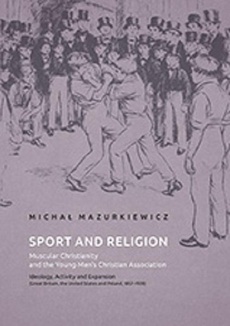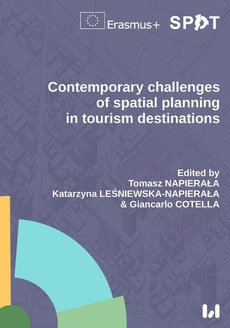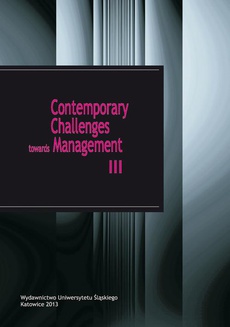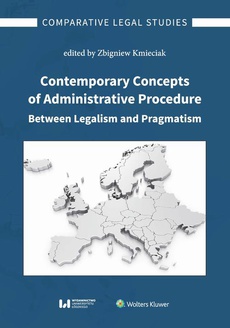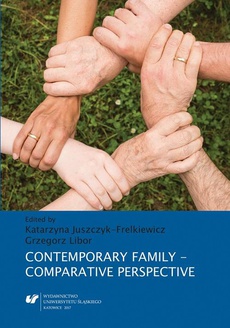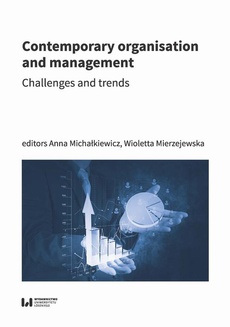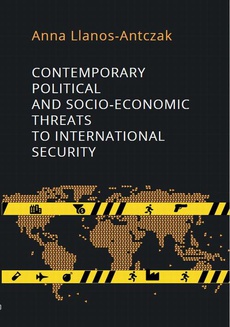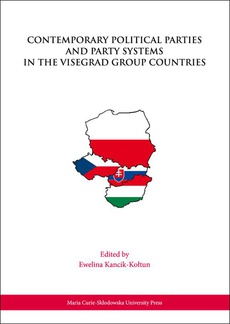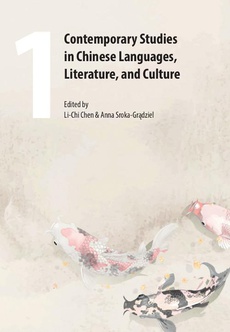INNE EBOOKI AUTORA
Eliot’s Christianity in a Contemporary Perspective
From Hindsight to Insight
Autor:
Wydawca:
Format:
epub, mobi, pdf
W książce przeprowadzono analizę wątków chrześcijańskich w poezji T.S. Eliota z perspektywy II wojny światowej, Zagłady oraz współczesnego kryzysu chrześcijaństwa w kulturze zachodniej. Omówiono dwa najistotniejsze motywy twórczości poety: kwestię Wcielenia Słowa oraz koncepcję miłości miłosiernej – agape.
*********
The book offers an analysis of Christian threads in T.S. Eliot’s poetry from the perspectives of World War II, the Holocaust and today’s crisis of Christianity in Western culture. The two most important motifs in the poet’s work are discussed: the issue of the Word made Flesh and the divine love – agape.
This book looks into the conversation between literature
and religion in the work of T.S. Eliot. It focuses on the figures of John the Baptist and the (Holy) Fool in The Love Song of J. Alfred Prufrock, the Wise Men in Journey of the Magi and the ʻwounded surgeon’ in East Coker, all of whom point to Eliot’s ongoing concern, both before and after his conversion, with the ‘hint half guessed, the gift half understood’ of poetic incarnation: words made living and suffering flesh.
This concern anchors Eliot’s poems in the idea of the Logos as Second Person, which has shaped Western cultures of reading over more than two millennia. It also reverberates in the works of the British and Polish poets invoked here alongside Eliot: W.H. Auden, E. Jennings, R.S. Thomas, G. Hill, K.K. Baczyński and Z. Herbert.
*********
Dr hab. Małgorzata Grzegorzewska (ORCID 0000-0002-0194-2919) – is a Professor of Literature in the Faculty of ‘Artes Liberales̓, University of Warsaw. Her work explores the connections among literature, philosophy and theology. Her extensive publications on Shakespeare and English metaphysical poetry include Herbert and Post-Phenomenology: "A Gift for Our Times" (2016) and a study in Polish of religious themes in Shakespeare’s plays ("Teologie Szekspira", 2018). She is the co-editor, with Mark Burrows and Jean Ward, of "Poetic Revelations. Word Made Flesh Made Word" (Routledge 2017), a collection of critical essays in the Power of the Word series.
Dr hab. Małgorzata Grzegorzewska (ORCID 0000-0002-0194-2919) – anglistka, szekspirolog, profesor literatury na Wydziale „Artes Liberales” Uniwersytetu Warszawskiego, wykładowca w Instytucie Anglistyki Uniwersytetu Warszawskiego. Zajmuje się literaturą i kulturą okresu Renesansu, w szczególności dramatem elżbietańskim i poezją metafizyczną. Autorka książek: "Scena we krwi. Williama Szekspira tragedia zemsty" (2006) i "Kamienny ołtarz. Horyzonty metafizyczne w tragedii antycznej i dramacie Williama Szekspira" (2007), "Trop innego głosu w angielskiej poezji religijnej epok dawnych" (2011), "Światłocienie. Osiem odsłon Słowa w literaturze brytyjskiej od Hopkinsa do Hughesa" (2017), "Teologie Szekspira" (2018) oraz licznych artykułów poświęconych związkom literatury z filozofią i teologią w pismach wydawanych w Polsce i poza jej granicami.
| Rok wydania | 2021 |
|---|---|
| Liczba stron | 182 |
| Kategoria | Język angielski |
| Wydawca | Uniwersytet Warszawski |
| ISBN-13 | 978-83-235-5277-2 |
| Numer wydania | 1 |
| Język publikacji | angielski |
| Informacja o sprzedawcy | ePWN sp. z o.o. |
POLECAMY
Ciekawe propozycje
Spis treści
| Acknowledgements | 9 |
| INTRODUCTION | |
| Time Past and Time Present | 11 |
| CHAPTER ONE | |
| In the Beginning was a Voice. John the Baptist in ‘The Love Song of J. Alfred Prufrock’ 20 | |
| 1. The Predecessor | 21 |
| 2. John the Baptist in the Bible | 25 |
| 3. Prufrock in the Wilderness | 28 |
| 4. Other Voices | 35 |
| CHAPTER TWO | |
| Foreign Eliot, or, The (Un)Holy Fool? Dostoyevsky and Lungin; Thomas and Jennings 42 | |
| 1. Which Fool? | 43 |
| 2. Eliot, Dostoyevsky and Lungin | 48 |
| 3. The Fool and Lazarus | 54 |
| 4. The Fool after Eliot: R.S. Thomas | 58 |
| 5. The Fool after Eliot: Elizabeth Jennings | 63 |
| 6. The Wise Men’s Folly | 66 |
| CHAPTER THREE | |
| Wystan Hugh Auden, Krzysztof Kamil Baczyński and Zbigniew Herbert in Conversation with Eliot. ‘Journey of the Magi’, Christmas Oratorio and ‘The Ballad of the Three Kings’ 72 | |
| 1. A Tale of the Child | 73 |
| 2. The Dream of a Youth | 75 |
| 3. An Old Man’s Story | 77 |
| 4. Auden: The Calling of the Star | 85 |
| 5. Baczyński: Three Kings in Pursuit of Joy | 95 |
| 6. Zbigniew Herbert: The Last Supper of the Magi | 104 |
| INTERMISSION | |
| A Dead Man’s Prayer | 111 |
| CHAPTER FOUR | |
| The Wounded Surgeon. The Kenotic Word of George Herbert and T.S. Eliot 117 | |
| 1. George Herbert’s Emulation of Christ | 117 |
| 2. Logos as Person: The Wounded Surgeon | 119 |
| 3. Reading Eliot in Retrospect: Shelley and Marvell | |
| 124 | |
| 4. ‘Apocalypse, now’ | 128 |
| CHAPTER FIVE | |
| The Sacraments of Love and Light. A Philosophical-Theological Postscript 135 | |
| 1. (Rose)Mary and Wild Thyme | 136 |
| 2. The Blooming Hawthorn Tree | 147 |
| 3. What End of Love? | 156 |
| Works Cited | 169 |
| Index of persons | 177 |
| Index of biblical quotations | 181 |

